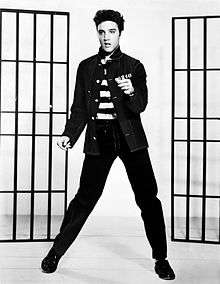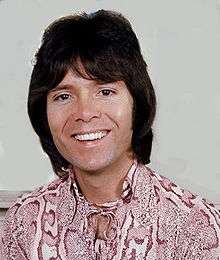List of best-selling singles of the 1960s in the United Kingdom
A single is a type of music release defined by the British Official Charts Company (OCC) as having no more than four tracks and not lasting longer than 25 minutes.[1] On 31 May 2011, a retrospective record chart was broadcast on BBC Radio 2 that listed the 60 biggest-selling singles in the United Kingdom during the 1960s.[2] The programme, entitled The Top 60 Best Selling Records of the 60s, was hosted by British DJ Tony Blackburn.[3] The chart was compiled by the OCC, and was based on sales of singles from 1 January 1960 to 31 December 1969.[4]
The most represented act in the chart is The Beatles, who feature on the list with 18 releases, seven of which are in the top twenty.[5][6] Similarly, the most represented record label is Parlophone, who released music from The Beatles between 1962 and 1968 in the UK.[7] The most represented act after The Beatles is The Rolling Stones, who have five singles in the list.[8] The highest-placed solo female artist on the list is Cilla Black at number 27, with her 1964 single "Anyone Who Had a Heart", which was also distributed by Parlophone.[3] Of the 60 discs in the chart, more than half (44) are by British acts.[5]
During the 1960s, sales of singles in the UK were monitored by several magazines, including New Musical Express (NME), Record Retailer, Melody Maker and Disc.[9] Before 1969, no officially recognised singles chart was published in the UK.[10] Until 10 March 1960, chart compilers used the weekly chart listed by NME, after which they moved to the singles list published by Record Retailer, despite NME having the wider circulation and higher readership.[9][10] During the start of the decade, Record Retailer was sampling roughly 30 stores; NME and Melody Maker had a sample size of more than one hundred.[9] One source explains that the reason for using the Record Retailer chart for the early 1960s was that it was "the only chart to have as many as 50 positions for almost the entire decade".[11] On 15 February 1969, Record Retailer and the BBC jointly commissioned the British Market Research Bureau (BMRB) to record sales of singles in what officially became the UK Singles Chart.[12] The BMRB compiled the chart by using hand-written and post-submitted data from approximately 250 record stores.[12]
Between 1960 and 1969, fourteen singles sold more than one million copies in the UK, of which the biggest-selling was "She Loves You" by The Beatles.[13][14] Released on 23 August 1963, the single spent six non-consecutive weeks at number one and sold more than 1.89 million copies, approximately 140,000 more than its nearest rival, "I Want to Hold Your Hand", also by The Beatles.[6] The biggest-selling record not to top the UK Singles Chart was Acker Bilk's 1961 instrumental "Stranger on the Shore" – it sold more than 1.13 million copies and peaked at number two, being kept off the top by "The Young Ones" by Cliff Richard and The Shadows, another million-seller.[15]
Singles



- 1 2 3 The record labels, years and chart peaks are those given by the OCC.[16]
- ↑ Magical Mystery Tour was released as an extended play in the UK, which, at the time, qualified it for the UK Singles Chart.[17]
References
- General (chart positions)
- Presenter: Tony Blackburn (31 May 2010). "The Top 60 Best Selling Records of the 60s". London. BBC. BBC Radio 2. Retrieved 16 July 2011. Missing or empty
|series=(help)
- Specific
- ↑ "Rules For Chart Eligibility: Singles" (PDF). London: Official Charts Company. August 2009. p. 5. Archived from the original on 24 June 2013. Retrieved 22 October 2011.
- ↑ "The Unswinging Sixties". London: BBC News. 3 June 2010. Archived from the original on 21 July 2011. Retrieved 2 September 2011.
- 1 2 "The Beatles' She Loves You tops Radio 2 chart of best-selling record of the Sixties". London: BBC. 31 May 2010. Archived from the original on 24 June 2013. Retrieved 23 November 2011.
- ↑ McSmith, Andy (1 June 2010). "The Beatles: bigger than Ken Dodd – but only just". The Independent. London. ISSN 0951-9467. OCLC 185201487. Archived from the original on 11 November 2012. Retrieved 2 September 2011.
- 1 2 "The Top 60 Best Selling Records of the 60s". London: BBC Programmes. 2010. Archived from the original on 22 February 2012. Retrieved 22 October 2011.
- 1 2 Low, Valentine (1 June 2010). "Ken Dodd single comes third in chart of bestselling Sixties singles". The Times. London. ISSN 0140-0460. OCLC 421637096. Retrieved 16 September 2011. (subscription required (help)).
- ↑ "Key Events in Harrison's Life". Fox News. 30 November 2001. Archived from the original on 4 December 2001. Retrieved 22 October 2011.
- ↑ "Doddy, daddy of the hit parade: Ken Dodd revealed as one of top selling chart stars of the Sixties". Daily Mail. London. 1 June 2010. Archived from the original on 6 February 2011. Retrieved 22 October 2011.
- 1 2 3 Leigh, Spencer (20 February 1998). "Music: Charting the number ones that somehow got away". The Independent. London. ISSN 0951-9467. OCLC 185201487. Archived from the original on 1 February 2012. Retrieved 5 August 2010.
- 1 2 Smith, Alan (December 2007). "50s & 60s UK Charts – The Truth!". davemcaleer.com. Archived from the original on 10 May 2011. Retrieved 22 October 2010.
- ↑ Warwick, Neil; Kutner, Jon; Brown, Tony (2004). The Complete Book of the British Charts: Singles and Albums (3rd ed.). London: Omnibus. p. v. ISBN 978-1-84449-058-5. OCLC 474573230. Retrieved 22 October 2011.
- 1 2 "Key Dates in the History of the Official UK Charts". London: Official Charts Company. Archived from the original on 10 January 2008. Retrieved 16 May 2010.
- ↑ "Million Sellers". London: The Official UK Charts Company. 2008. Archived from the original on 16 April 2008. Retrieved 22 October 2011.
- 1 2 "Ken Dodd 'third best-selling artist of 1960s'". London: BBC News. 1 June 2010. Archived from the original on 26 September 2010. Retrieved 2 September 2011.
- ↑ "Acker Bilk". London: Official Charts Company. Retrieved 14 September 2016.
- ↑ "Artist Chart History". London: Official Charts Company. 2010. Retrieved 9 September 2011.
- ↑ "30th December 1967". London: Official Charts Company. 2011. Archived from the original on 6 June 2012. Retrieved 15 November 2011.
